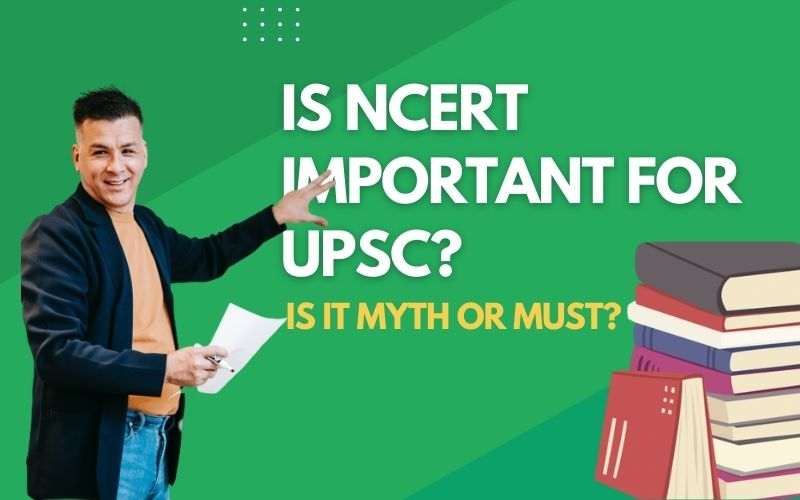Cracking UPSC? Is NCERT Important For UPSC? Don’t skip NCERTs! Build strong base, answer confidently. Get clarity on their role & how they boost your success.

Get Best NCERT Books for UPSC. Check it Out
Ever dreamt of becoming a civil servant in India? The UPSC Civil Services Examination, often referred to as the “mother of all exams,” opens doors to prestigious careers in administration, diplomacy, and more. But with its vast syllabus and competitive nature, navigating the path to success can seem daunting. Here’s where NCERT textbooks come in – not as magic bullets, but as powerful foundational tools to build your UPSC dreams upon.
Understanding the UPSC Exam
Before diving in, let’s get familiar. The UPSC exam tests your knowledge across diverse subjects like history, geography, polity, and economics. It’s a marathon, not a sprint, requiring thorough preparation and a comprehensive understanding of the syllabus.
What is NCERT?
Enter NCERT – the National Council of Educational Research and Training. These textbooks, designed for school students, might seem basic, but they hold goldmines of information for UPSC aspirants. They offer:

- Clear and concise explanations: Easy-to-understand language makes grasping complex concepts a breeze.
- Solid foundation: They cover the core concepts of each subject, forming a strong base for further exploration.
- Alignment with the UPSC syllabus: Many NCERT topics directly correspond to the exam, making them a relevant and valuable resource.
Why are NCERTs Important?
NCERT textbooks, designed by subject experts, offer precisely that – a clear, concise, and well-structured foundation in various subjects relevant to the exam. From history and geography to polity and science, NCERTs lay out the core concepts in a language that’s easy to grasp. This foundational knowledge equips you to:
Get Best NCERT Books for UPSC. Check it Out
NCERTs have numerous advantages:
- Solid Foundation: They cover fundamental concepts comprehensively, building a strong base for further learning.
- Clear Explanations: Written in simple language, they make complex topics easier to grasp.
- Aligned with Syllabus: Many topics in the UPSC syllabus are directly linked to NCERT content, giving you a head start.
- Develop analytical skills: The books encourage critical thinking by presenting information objectively and often posing thought-provoking questions.
You may also read: CBSE or ICSE Which is Better For Future in 2024

Get Best NCERT Books for UPSC. Check it Out
Direct Questions and Reliable Source:
Beyond building intellectual agility, NCERTs hold another advantage: they’ve been known to be a direct source of UPSC questions! Over the years, several questions have been directly lifted from NCERT textbooks, especially for the Preliminary examination. Additionally, the information presented in NCERTs is generally considered accurate and unbiased, making them a reliable source for factual knowledge.
But Are They Enough?
While NCERTs are invaluable, they have limitations. it’s critical to remember that NCERTs are not a one-stop shop for UPSC success. While NCERTs form an essential base, they might lack depth in certain areas and miss out on current affairs. So, their limitations need to be acknowledged:
- Limited Depth: Primarily designed for school education, NCERTs often lack the depth and analysis required for advanced-level examinations like UPSC. While they provide a strong starting point, further resources are essential for in-depth understanding.
- Static Information: As textbooks, NCERTs might not always reflect the latest developments or contemporary issues. Staying updated with current affairs and supplementing your knowledge with relevant newspapers and periodicals is crucial.
- Focus on Basics: While beneficial for General Studies, NCERTs might not be sufficient for optional subjects. Depending on your chosen optional, you might need to explore specialized reference materials and expert guidance.
NCERT vs. Other Resources: Finding the Right Balance
Don’t think of NCERTs as standalone islands. Integrate them with other resources like reference books, coaching materials, and current affairs updates. Remember:
- Diversification is key: Mix and match resources to gain different perspectives and in-depth knowledge.
- NCERTs first: Use them to build your foundation before moving on to more advanced materials.
- Practice makes perfect: Solve previous years’ question papers and mock tests to apply your knowledge strategically.
Get Best NCERT Books for UPSC. Check it Out
Success Stories
Don’t just take our word for it! Many UPSC toppers credit NCERTs as their foundation. Their experiences prove that using NCERTs effectively, along with other resources, can be a winning formula. Draw inspiration from their journeys and utilize NCERTs effectively. Heed the advice of experienced coaches and mentors to optimize your preparation.

Expert Insights
UPSC coaches and mentors emphasize the importance of strategic use of NCERTs. They recommend:
- Focus on understanding concepts, not just memorizing facts.
- Make notes, highlight key points, and create mind maps for revision.
- Correlate NCERT topics with current events for deeper understanding.
Get Best NCERT Books for UPSC. Check it Out
Remember:
- NCERTs are a valuable foundation, not a substitute for comprehensive preparation.
- Diversify your study materials to cover various aspects of the exam.
- Use NCERTs strategically to build a strong base and enhance your understanding.
So, What’s The Takeaway?
So, is NCERT important for UPSC? Absolutely! But it’s just one piece of the puzzle. Think of it as your first step, laying the groundwork for a strong and comprehensive understanding. However, remember that:
NCERTs are undeniably valuable for UPSC preparation. They offer a solid foundation, clear explanations, and sometimes even direct exam questions. However, they are not a substitute for comprehensive preparation. Consider them as the first step in your UPSC journey, not the final destination. Here’s how to approach them effectively:
- NCERTs are not enough: Use them as a foundation, but supplement them with other study materials like reference books, current affairs compilations, and online resources.
- Prioritize: Focus on NCERTs relevant to the UPSC syllabus, particularly for General Studies.
- Actively Engage: Don’t just passively read. Underline key points, make notes, and practice summarizing the information.
- Supplement Wisely: Use NCERTs as a launchpad, then branch out to additional resources like reference books, current affairs analysis, and mock tests.
- Develop Critical Thinking: Don’t blindly accept everything – analyze, question, and form your own understanding.
Remember, the UPSC journey is a continuous learning process. NCERTs are your launchpad, providing a strong foundation and clear direction. Use them effectively, supplement with other resources, and stay focused on your goal. With dedication and the right strategy, you can crack the code and achieve your UPSC dreams!
Disclaimer: This article is for informational purposes only and does not constitute professional guidance. It’s always advisable to consult experts and tailor your preparation strategy to your individual needs and learning style.

Hi I am Harish. I am a blogger, writer. I am also a photographer. I love to share my thoughts and experiences through the words in my blog. Thank you.



